|
|
|
Sort Order |
|
|
|
Items / Page
|
|
|
|
|
|
|
| Srl | Item |
| 1 |
ID:
176742
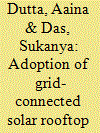

|
|
|
|
|
| Summary/Abstract |
Renewable energy is being seen as a transformative solution to meet energy as well as economic challenges at national as well as at a global level. The Government of India has expressed its intent to achieve 100 GW of solar capacity in the country by 2020. However, one such state that lags in harnessing and achieving the solar targets is the state of Jammu and Kashmir despite having the second highest potential of solar energy. Jammu and Kashmir is a power deficit state though it has one of the best potentials in solar energy. Solar rooftop PV systems can solve most of the problems regarding power deficit, but yet people are naïve about solar rooftop PV systems. The purpose of this study is to perform stakeholder analysis to investigate the perceptions of the groups/individuals regarding grid connected solar rooftop PV systems. They have a critical impact on the result of the study as they provide fundamental data on the political, social and economic scenario of any study area. The findings from the investigation underscores that all the projects and programs related to the adoption of a solar rooftop system should concentrate on building awareness.
|
|
|
|
|
|
|
|
|
|
|
|
|
|
|
|
| 2 |
ID:
176735


|
|
|
|
|
| Summary/Abstract |
The Saudi National Renewable Energy Program aims to substantially increase the share of renewable energy in the Kingdom's power generation mix. This study explores the extent to which solar rooftop deployment at the residential scale in Riyadh, could be cost-efficient and could accelerate decarbonization of in Saudi Arabia.
This study found that the maximum aggregate solar power capacity in Riyadh at the residential level would be around 400 MW. Also, the current residential electricity tariff does not incentivize photovoltaic (PV) solar rooftop deployment. Despite an increase in Saudi residential electricity prices in January 2018, rooftop solar PV cannot compete with electricity from the grid, even assuming aggressive reductions in the investment cost of solar technology.
|
|
|
|
|
|
|
|
|
|
|
|
|
|
|
|
| 3 |
ID:
176721


|
|
|
|
|
| Summary/Abstract |
The choice of the most appropriate public policies to foster energy efficiency measures often is a difficult task due to the large number of intervening variables and agents and, also, high levels of uncertainties in estimating the corresponding energy savings. This paper presents a methodology that builds up scenarios to assess the impacts on energy consumption of introducing different levels of penetration of efficient electric induction motors, according to the set of policies and measures adopted in the scenarios. The proposed methodology comprises three modules. The first one selects strategic objectives, key variables and control players, determines their direct and cross-influence levels, based on the opinions of consulted experts, and sets up some scenarios combining them. The second module carries out electric motor sales forecasts based on electricity consumption forecasts for the industry. The third module estimates the energy saving forecasts associated to each scenario. The approach is applied to Brazil in the paper, indicating valuable policy options and their likelihood to local decision makers and other stakeholders.
|
|
|
|
|
|
|
|
|
|
|
|
|
|
|
|
| 4 |
ID:
176771


|
|
|
|
|
| Summary/Abstract |
With rapidly expanding real GDP in Vietnam, it is anticipated that the Vietnamese energy production will increase to meet its rising energy consumption. An important corollary is that pollution will also rise since the energy sector is considered a big polluter in the developing world. This paper brings two important insights to this literature: first and foremost, this paper seeks to establish if any behavioural biases of policy makers have clouded the decision to adopt suitable energy technologies and policies in Vietnam with far-reaching consequences for sustainability in the region. Secondly, in order to detect behavioural biases, it considers the asymmetric effects of increases vis-à-vis decreases in regressors by using the non-linear autoregressive distributed lags (NARDL) models, to examine how such increases or decreases really impact on pollution in Vietnam. Using annual data from 1982 to 2015, the analysis finds that the long-run relationships between pollution, energy use and oil prices have been characterised by non-linear and asymmetric interlinkages to indicate hidden cointegration. We further argue that such hidden cointegration can signal important behavioural biases in (energy) policy-making.
|
|
|
|
|
|
|
|
|
|
|
|
|
|
|
|
| 5 |
ID:
176744


|
|
|
|
|
| Summary/Abstract |
While using carbon taxes to reduce greenhouse gas emissions may well be effective, this has recently proved too unpopular to put into practice in a number of countries. Yet, at a time when governments across the world are preparing their nationally determined contributions to the Paris Agreement, our knowledge of whether and why people oppose these taxes originates from a single or small number of cases. Drawing on the European Social Survey (n = 44,387), this article provides evidence on public attitudes towards increasing taxes on fossil fuels to reduce climate change from 23 countries, most of which have never featured in the literature before. The results point to a widespread aversion to carbon taxes. On the one hand, this worsens with the perceived costs of taxes, such as the case among consumers who depend highly on energy. On the other, it improves with political trust and external political efficacy—factors that help ease the uncertainty around policy proposals. Our estimations suggest that the effect of changes in these factors alone would be large enough to reverse the public resistance to carbon taxes in some countries. These results are robust to a number of alternative specifications and various checks.
|
|
|
|
|
|
|
|
|
|
|
|
|
|
|
|
| 6 |
ID:
176743


|
|
|
|
|
| Summary/Abstract |
This paper intends to examine the key drivers of household environmental attitudes and energy-saving behavior using both observed and stated attitudinal factors. Beginning with an assessment of energy-saving behaviors Item Response Theory (IRT), we associate hierarchical multivariate regression with an innovative variable selection approach via Elastic Net Selection (ENS). Our empirical study is based on data from the 2012 ENERGIHAB project survey. Empirical evidence in this article contributes with new insights about the main explanatory factors of household energy-saving behavior. The main results further suggest that energy-saving behavior tends to fluctuate throughout time in households. Our findings and approach generate broader methodological insights into energy efficiency analysis through behavioral aspects.
|
|
|
|
|
|
|
|
|
|
|
|
|
|
|
|
| 7 |
ID:
176754


|
|
|
|
|
| Summary/Abstract |
The 2050 target of the European Union to decarbonize the economy by 80–90% will undoubtedly see marine renewable energies playing a key role. The deployment of offshore facilities within the framework of Blue Growth creates tension as competition for other uses of the sea intensifies as economic exploitation of marine resources increases. Marine spatial planning (MSP) is being applied in different Member States, mainly in the North Sea basin, as a way of easing tensions while promoting blue energy. The southernmost marine areas of the continent also have considerable energy potential that, as yet, has not been exploited due to the limitations imposed by a narrow and steep continental shelf, not to mention legal and administrative barriers. MSP processes currently being developed by the application of Directive 2014/89/EU present an opportunity to resolve these conflicts and promote sustainable use of MRE sources in southern Europe. This paper analyzes the marine spatial planning process of five southern European countries - Spain, Greece, Italy, Malta and Portugal - with the aim of determining the degree to which they are incorporating blue energy policies.
|
|
|
|
|
|
|
|
|
|
|
|
|
|
|
|
| 8 |
ID:
176751


|
|
|
|
|
| Summary/Abstract |
Businesses are often involved in climate change governance and form networks to influence policy. They are evidently important for the implementation of market-based emission trading schemes and their general role has been widely discussed. However, there is a variety of business networks, and their specific structures and organizing styles are poorly understood, particularly in the non-Western context. This study identifies the ways in which one of these networks was organized and performed a governing function in the development of an emission trading scheme in China. We found that the policy development was neither highly top-down nor bottom-up, and business participation was hierarchical. Key governing roles were effectively performed by a small group of collaborating business organizations, which were essentially public-private hybrid actors and able to build linkages between the top and the bottom levels. The findings indicate the decisive qualitative differences in business leadership in the development of market-based policy.
|
|
|
|
|
|
|
|
|
|
|
|
|
|
|
|
| 9 |
ID:
176761
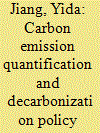

|
|
|
|
|
| Summary/Abstract |
The household sector has been identified as a major driver of the economy and an important contributor to greenhouse gas (GHG) emissions. It is also pointed out by existing studies that influential factors of household emissions range from socioeconomic to geographic aspects. Promoting efficient and feasible decarbonization actions therefore calls for the quantification of the variability in emission patterns and its relationship with contextual factors. In this study, using data on monthly household expenditures at the city level, direct and indirect carbon emissions resulting from household consumption in 51 major Japanese cities in 2011 are calculated. A regression analysis is also conducted to explore the relationship between emissions from the household sector and the socioeconomic, demographic, and climatic characteristics of Japanese cities. Our results indicate seasonality and categorical differences in residential carbon emissions for cities in Japan. We also find per capita income, urban population density, and proportion of the population over 65 years old to be the most influential variables that shape the residential emission landscape of Japanese cities. We thus suggest that seasonality, categories of consumption, and city characteristics be considered as crucial factors in policy making for emission mitigation targeting consumption behavior of urban residents.
|
|
|
|
|
|
|
|
|
|
|
|
|
|
|
|
| 10 |
ID:
176783


|
|
|
|
|
| Summary/Abstract |
The paper examines the interactions between nuclear and variable renewable generation capacities (vRES) under various assumptions in the broader V4 region. Four exploratory scenarios are analysed with high and low penetration levels of vRES and nuclear applying electricity dispatch and unit commitment models. The assessment quantifies the impacts of the joint evolution of these technologies, measuring the effect on utilisation rates, wholesale prices, market values of vRES, energy not supplied (ENS) and the changing production and trading patterns in the projected 2035 electricity system. The results are indicative of a ‘double competition’ between (i) nuclear and vRES technologies within the merit order and (ii) between the NPPs in the region. If the ambitious V4 nuclear plans are indeed execute, NPPs will compete for limited export opportunities during times of high vRES production periods. Thus, coordination of long term energy policies within the V4 region is critical to manage nuclear and vRES developments and trade patterns with the aim of improving flexibility and security of supply to mitigate the negative economic impact on the electricity system.
|
|
|
|
|
|
|
|
|
|
|
|
|
|
|
|
| 11 |
ID:
176746
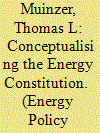

|
|
|
|
|
| Summary/Abstract |
In order to elucidate key aspects of the relationship between energy and constitutionality, Muinzer and Ellis (2017) have mapped the full spectrum of UK reserved/devolved constitutional powers and thrown into relief the complex form and nature of low carbon energy powers within that nexus. This low carbon-specific framework, and an understanding of its complex, contingent qualities and interconnected constitutional principles provides insight into the extent to which constitutional arrangements reify the territoriality of energy governance and policy capacity, structuring the policy and governance relationships between national and substate multi-level decarbonisation processes. This study develops this ‘Energy Constitution’ framework with reference to fuel poverty, honing in on the UK and according particular attention to Northern Ireland, a UK jurisdiction that often receives little attention in energy policy studies, but that has had notably high levels of fuel poverty, in addition to the weakest substate economy and the most energy insecure circumstances in the UK.
|
|
|
|
|
|
|
|
|
|
|
|
|
|
|
|
| 12 |
ID:
176748


|
|
|
|
|
| Summary/Abstract |
Daylight Saving Time (DST) policies have been in use since early in the 20th century. However, their energy saving effect is under review. The generalization of LED lighting has reduced the impact of lighting energy on the total energy consumption and, therefore, the effect of DST has been reduced. Nevertheless, in order to design an effective new policy in this aspect, it is necessary to understand how total electricity consumption would be affected by it but also how the load daily profile would change. This paper proposes an hourly load model that quantifies the effect of daylight on electricity consumption and simulates the effect of different DST policies. The model is applied to the inland Spanish electricity system and the three scenarios more likely to be implemented if current DST policy is changed: year round winter time (UTC+1), year round summer time (UTC+2) and keep DST but change clock 1 h back (GMT). The results show how changes in sunrise and sunset times affect daily load profiles. They provide overall, monthly and hourly energy savings for each scenario that are necessary for a well-informed DST policy design and implementation.
|
|
|
|
|
|
|
|
|
|
|
|
|
|
|
|
| 13 |
ID:
176722


|
|
|
|
|
| Summary/Abstract |
The UK has some of the worst performing residential buildings in the EU from an energy efficiency perspective. Natural gas remains a dominant feature of existing and new-build housing with strong historical, technical, and social barriers to change. Consequently, the residential sector is responsible for significant shares of national emissions and has a strong role to play under ambitious net zero targets.
|
|
|
|
|
|
|
|
|
|
|
|
|
|
|
|
| 14 |
ID:
176752


|
|
|
|
|
| Summary/Abstract |
Despite the insufficiency of accessible energy along with a steady increase in energy consumption in the least developed countries, there are still limited numbers of studies on residential energy-saving behaviors and its determinants in such countries. Hence, this study investigates the determinants of urban residents’ energy-saving behaviors in Myanmar. Specifically, this study has attempted to investigate the effects of knowledge about energy issues, degree of concern, perceived energy-saving control, and sense of responsibility on energy-saving behaviors of urban residents in Myanmar. This study is empirically tested via multiple regression, using survey data collected from urban residents of Myanmar (n = 200). Results show that knowledge about energy issues, degree of concern, perceived energy-saving control, and sense of responsibility positively and significantly influence energy-saving behaviors. Among four determinants, the degree of concern has the most significant impact on urban residents’ energy-saving behaviors. Being the first empirical study that has explored the determinants of urban resident’s energy-saving behaviors in Myanmar, this study makes good recommendations for Myanmar policymakers in formulating and implementing energy-saving and environmental protection policies. Furthermore, this study intends to serve as a reference to stakeholders who are involved in enhancing energy-saving behaviors in the least developed countries like Myanmar.
|
|
|
|
|
|
|
|
|
|
|
|
|
|
|
|
| 15 |
ID:
176732


|
|
|
|
|
| Summary/Abstract |
Lesotho has a poverty rate above 50%, this renders a bulk of households connected to the grid unable to purchase enough energy to cover the essential basic needs at the current tariffs. This is supported by the declining average household consumption reported by Lesotho Electricity Company (LEC) despite an increasing customer base. Even more crucial, for low income countries, tariff levels should balance social stability, affordability, fairness, energy efficiency as well as cost recovery especially because the poor make up the majority of the population. Based on the poverty line, a lifeline tariff of 0.5 to 0.6 Maloti(M)/kWh (2017 tariffs) for a threshold of up to 30 kWh/month is proposed which is 35%–42% lower than the current domestic tariff of 1.424 M/kWh. The standard domestic tariff will need to increase to 1.856 M/kWh to allow for cross-subsidisation and hence maintain the financial standing of the utility company. The threshold capacity is based on the observation that in 2016, around 30% of grid connected households consumed less than 30 kWh/month which is enough electricity to cover the basic needs of an average household. Hence, an increasing block tariff (IBT) approach is proposed such that the first 30 kWh/month are set at a lifeline tariff and any excess is charged at a standard rate which is set such that it cross-subsidises the lifeline tariff.
|
|
|
|
|
|
|
|
|
|
|
|
|
|
|
|
| 16 |
ID:
176763
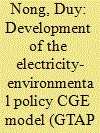

|
|
|
|
|
| Summary/Abstract |
A new carbon price mechanism with full emission coverage is developed within the framework of a global computable general equilibrium model (GTAP-E-PowerS) to enhance the capacity and accuracy for climate change and energy policy assessment. The model developed is then used to examine the potential impacts of the carbon tax in South Africa. Results show that incorporation of non-CO2 emissions in the model significantly alters the results of which the economy of South Africa experiences higher costs compared to the case that only has CO2 emissions. When more sectors are included in the policy it also puts higher costs on the economy, as higher levels of emissions are subject to the carbon tax. Results also show that South Africa only experiences small tradeoffs from introducing the carbon tax in all scenarios. That is, with a tax rate of $9.15, the country is able to reduce its emission levels by 12.25%–15.6% at the costs of real GDP reduction by 1.17%–1.59%. Fossil-based industrial sectors are particularly worst off, while clean and renewable energy sectors strongly expand their production. The results indicate that South Africa is likely to move to a low carbon and sustainable economy with such a policy.
|
|
|
|
|
|
|
|
|
|
|
|
|
|
|
|
| 17 |
ID:
176773


|
|
|
|
|
| Summary/Abstract |
The rapid increase in anthropogenic carbon dioxide (CO2) emissions in recent decades is a major concern because CO2 emissions are the main precursor of global warming. Thus, a clear understanding of the factors behind this increase is crucial for the design of policies that limit or at least stabilize global concentrations of CO2. In this study, we investigate factors driving the growth in global CO2 emissions over the last two decades (between 1997 and 2015) using the logarithmic mean Divisia index (LMDI) method. The analysis shows that economic growth is the main driver of CO2 emissions during the 1997–2015 period. Population growth is also responsible for increased CO2 emissions, mainly in low-income countries. Without lowering energy intensity and increasing the deployment of clean and renewable energy, CO2 emissions during 1997–2015 would have been almost 50% higher than the observed level. The analysis also shows that the factors driving CO2 emission growth vary among countries from different per-capita income brackets. The analysis emphasizes the need to reduce CO2 more rapidly in highly industrialized countries and to continue to support reduction of CO2 in developing countries, per the United Nations Framework Convention on Climate Change (1992) Common But Differentiated Resposibilities.
|
|
|
|
|
|
|
|
|
|
|
|
|
|
|
|
| 18 |
ID:
176780


|
|
|
|
|
| Summary/Abstract |
Building upon the literatures of policy stringency, policy effectiveness and clean technological change, this paper explores the question of whether the renewable portfolio standard (RPS) serves as a floor or a cap on renewable electricity capacity deployment in the U.S. In particular, we examine the effect of RPS policy stringency on renewable electricity capacity additions beyond compliance. A panel dataset from 1998 to 2017 is constructed for 28 states that have adopted a mandatory RPS in this timeframe. Using hybrid random effects negative binomial regression models, we find that when constrained by renewable electricity potential capacity (potential capacity < 403.4 GW), more stringent RPSs are significantly associated with a lower level of non-RPS related renewable electricity capacity additions. This negative effect of the RPS on beyond RPS compliance renewable electricity development is weakened by the abundance of renewable energy resources. For states endowed with large renewable energy resources, a stringent RPS policy can motivate utilities and other energy producers to invest in renewable electricity capacity beyond the mandatory target. These findings contribute to the policy stringency and policy effectiveness literatures, and improve our understanding of the relationship between clean energy technology adoption and energy policy.
|
|
|
|
|
|
|
|
|
|
|
|
|
|
|
|
| 19 |
ID:
176767
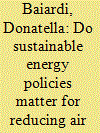

|
|
|
|
|
| Summary/Abstract |
Yes, they matter. To reply to this question, we assess the impact of energy efficiency and renewable energy policies on six different air pollutants: carbon dioxide (CO), methane (CH), nitrous oxides (NO), non-methane volatile organic compounds (NMVOCs), nitrogen oxides (NO) and sulfur dioxide (SO) in Italian provinces in the decade 2005–2015. The empirical analysis is performed in a panel data context by means of propensity score matching with multiple treatments, since our framework is characterized by the presence of two treatments, corresponding to the two different energy policies analyzed, i.e. energy efficiency policy and renewable policy. These two policies can be applied by each province as mutually exclusive strategies or as joint strategies. Our results show that renewable policies are the most effective in terms of climate goals especially when implemented on a local scale, while energy efficiency policies alone are ineffective. Moreover, the success of these policies depends on the type of pollutant to be reduced. Finally, we note that the effect of energy policies was reinforced by the counter-cyclical fiscal policies implemented to counter the Global Financial Crisis in 2008.
|
|
|
|
|
|
|
|
|
|
|
|
|
|
|
|
| 20 |
ID:
176728


|
|
|
|
|
| Summary/Abstract |
The exploration of natural gas (NG) in the East Mediterranean has been occurring in an environment characterized by continuous geopolitical instability. Countries are seeking ways to weigh development costs with geopolitical risks, which may hamper gas export to final destinations in the region, Europe and beyond. This paper aims to explore economic viability of NG export pipelines from Lebanon to different markets by developing a techno-economic model, and to assess the geopolitical implications associated with the proposed pipelines. As the economic dimension is not the only factor in any export strategy in the region, this paper will also present an overview of the major geopolitical players and their direct or indirect impact on the development of export options for Lebanon. For instance, the long lasting conflicts between the Palestinians and the Israelis, the Turkish-Cypriot knot, the provoking foreign politics of Turkey, the Iranian expanding influence in the region and the influence of the super powers in regional politics are all discussed with a view to understand the geopolitical impact on the gas export decisions. The paper concludes with policy recommendations to inform decision makers about the possible export options from economic and geopolitical perspectives.
|
|
|
|
|
|
|
|
|
|
|
|
|
|
|
|
|
|
|
|
|